#impeachment of andrew johnson
Explore tagged Tumblr posts
Text
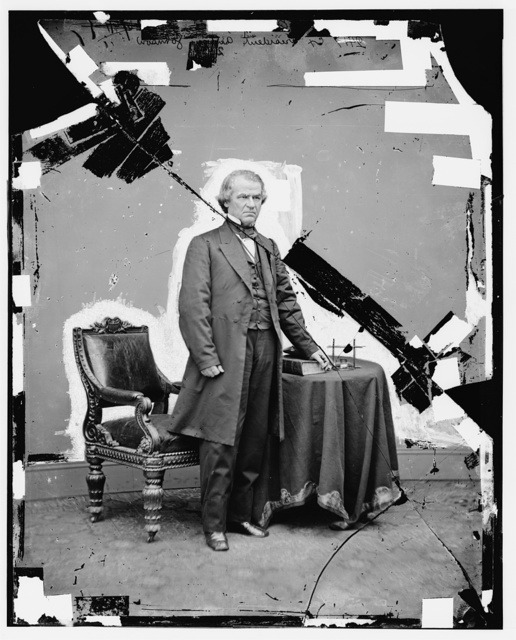
"Johnson is an insolent, drunken brute in comparison with which Caligula's horse was respectable."
-- Senator Charles Sumner (R-Massachusetts) on President Andrew Johnson
#History#Presidents#Andrew Johnson#President Johnson#Vice Presidents#Presidential History#Quotes About Presidents#Quotes#Charles Sumner#Senator Sumner#Reconstruction#Politics#Political History#Political Leaders#Political Rivalries#Radical Republicans#Civil War#Assassination of Abraham Lincoln#Lincoln Assassination#Inauguration of Andrew Johnson#Impeachment of Andrew Johnson#Johnson Impeachment#Political Feuds#Presidency#Congress#U.S. Senate
28 notes
·
View notes
Text
The Impeachment of Andrew Johnson: A Battle Over Reconstruction
The impeachment of Andrew Johnson, the 17th President of the United States, stands as a significant event in American history. Taking place in 1868, this dramatic episode arose from Johnson’s controversial approach to Reconstruction and his violation of the Tenure of Office Act. This clash between the executive and legislative branches of government highlighted the turbulent post-Civil War era…
0 notes
Text
Working on Knitwear Club is fun, but not when you spend nearly a week trying to straighten out a character's dumbest fucking decisions and most convoluted fucking schemes.
Still, learning about the history of presidential impeachments was fun!
#Knitwear Club#Donald Trump#David Hoope#impeachment#Andrew Johnson was a hoot and a half#writing#only minor minor spoilers
0 notes
Text
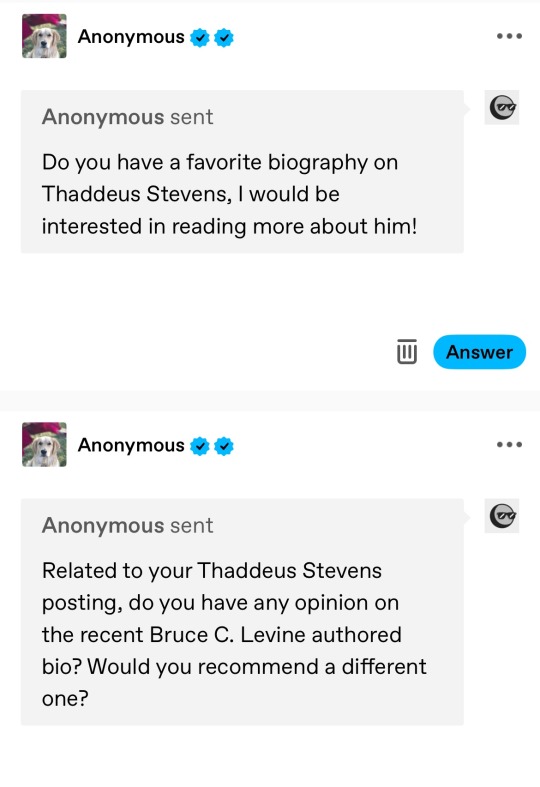
Hello Anonymouses! I do strongly recommend Bruce Levine's biography of Thaddeus Stevens (Thaddeus Stevens: Civil War Revolutionary, Fighter for Racial Justice). Levine's Fall of the House of Dixie is one of my favorite civil war books, just across the board. He's a great, emotionally stirring storyteller and so is a great evangelist for the narrative that the Civil War was the 2nd American Revolution.
Two other books that are also really good are Brenda Wineapple's The Impeachers, which is focused specifically on the impeachment of Andrew Johnson and Eric Foner's The Second Founding, which is about the 13th, 14th and 15th amendments and so, of course, is pretty top of mind these days.
28 notes
·
View notes
Text
Oh my. Oh my fucking—
Okay, it cannot have escaped y'all that I am a giant Internet-native nerd of a certain age with a strong penchant for folk and a long entrenched fondness for earnest singing about history, and so of course I listened to a lot of Jonathan Coulton when I was in high school.
I seized with particular glee on "The Presidents" when he released it in 2006 because I take took AP American History extremely seriously, and it offers some very handy little mnemonics that help you remember who goes where. If you haven't heard it before, here's a link. Each president gets a little line with a cheeky reference to the most memorable thing from their presidency, ranging from "James Monroe told Europe they could suck it" to "Washington came first and he was perfect" to "Andrew Johnson just survived impeachment," and it's set to a jaunty and extremely memorable tune.
And of course I looked up the specific references. I get curious a lot, and like a lot of folk music fans, I've learned a lot about historical incidents by tracing lyrics back. But there was one line that always eluded me, and it haunted me a bit because it hinted that there might be a better candidate for "America's First Gay President" than that feckless wastrel Buchanan. I never found any other reference to it, but the President is a fairly recent one and eventually I wrote it off as a reference to some kind of contemporary scandal that was just a bit out of focus; I remembered the Monica Lewinsky thing ("Clinton gave an intern a cigar") and presumably it had been something like that. Occasionally I would look into it, but never very hard before I drifted on to other eras of history.
Friends, I figured it out tonight. I have —nearly twenty years into knowing and frequently whistling this song—I suddenly reached understanding.
The line is "Jimmy Carter lusted in his heart for peanuts."
All has become clear!
50 notes
·
View notes
Text
On Aug. 8, 1974, Republican U.S. President Richard Nixon shocked the nation. Following more than a year of multiple investigations into his administration over the Watergate scandal, Nixon went on television and announced that he would be resigning from office the following day.
“To continue to fight through the months ahead for my personal vindication would almost totally absorb the time and attention of both the president and the Congress in a period when our entire focus should be on the great issues of peace abroad and prosperity without inflation at home,” Nixon said as the nation watched. “Therefore, I shall resign the presidency effective at noon tomorrow.”
Less than two years earlier, Nixon had defeated South Dakota Sen. George McGovern, the Democratic Party’s candidate, in a landslide victory that pundits had compared to former President Franklin Roosevelt’s historic reelection in 1936. But now, Nixon became the first president in the nation’s history to step down before finishing his term. Americans were stunned and relieved. But even as Nixon’s administration has come to represent the ultimate rupture of a presidency, his was in fact the third consecutive administration to end in disruption in the mid-20th century. John F. Kennedy had been assassinated in November 1963. Lyndon Johnson had unexpectedly withdrawn from his reelection campaign in 1968. And then, six years later, Nixon would resign.
Nor was the outcome inevitable, as it may seem today. Nixon had fought when Congress, a grand jury, special prosecutors, judges, and reporters tried to find out what his role had been in the break-in at the Democratic National Committee headquarters in June 1972, and whether he had obstructed subsequent investigations. Just a few days before Nixon’s announcement, a mere 31 percent of Republicans polled by Gallup felt that he should no longer hold the office.
The pressure had mounted. On July 24, in United States v. Nixon, the Supreme Court ruled that the president must turn over secret White House tape recordings—one of which contained a “smoking gun” in which legislators could hear him in a conversation with advisor H.R. Haldeman, agreeing that they should persuade the CIA to stop the FBI from looking into the matter. On Aug. 7, Sen. Barry Goldwater, Senate Minority Leader Hugh Scott, and House Minority Leader John Rhodes—all Republicans—met with Nixon and said that if the House voted to send them articles of impeachment, which seemed likely, many in the GOP would join the Democrats in voting to remove him from office. Nixon’s job approval, according to Gallup, fell to 24 percent, with more than a majority of the country thinking he should leave. That’s what he did.
On Aug. 9, at 9:31 a.m., the president entered into the East Room with the first lady, Pat Nixon, and addressed a small group of cabinet officials, friends, and supporters. As he held back tears during different moments of his talk, Nixon advised everyone who was surrounding him: “Aways give your best. Never get discouraged, never be petty. Always remember, others may hate you, but those who hate you don’t win unless you hate them, and then you destroy yourself.”
He then went down to the Diplomatic Reception Room, where he wished the new president, Gerald Ford, good luck. Nixon walked up the staircase to the helicopter that was waiting for him outside, turned to look at the White House one last time as president, waved with his fingers shaped as a “V” for victory, and then flew off to Andrews Air Force Base, where Air Force One brought him back to California.
“With his departure,” wrote Jules Witcover in the Washington Post on Aug. 9, “he leaves behind a political legacy of negativism that far transcends the damage to his own party.”
Nixon’s presidency came to an abrupt end, but the resignation was just the final stage of a tumultuous era. The nation had been embroiled in fierce internal battles over issues such civil rights and the war in Vietnam. College campuses had been rocked by ongoing protest. Even the clothing that a person chose to wear sent strong signals about what they stood for. The Democratic Convention in August 1968 in Chicago had been a fiasco. The whole world watched as anti-war activists clashed with Mayor Richard Daley’s police force; inside the convention, anti-war delegates fought with supporters of then-Vice President Hubert Humphrey, who had become the nominee when Johnson withdrew from the race
And all of this took place after there had been a series of assassinations that started with Kennedy. When Martin Luther King Jr. was killed in Memphis, Tennessee, in April 1968, unrest swept through major cities. When an assassin killed one of the late president’s brothers, Sen. Robert F. Kennedy, in June, many young people lost all hope.
It is not a surprise that in 1974, Knopf published Robert Caro’s The Power Broker, a masterful work that would come to be considered one of the greatest nonfiction books of the century. Caro traced the career of the legendary unelected civil servant Robert Moses, who started his career as an idealistic reformer but ended as someone who did whatever was necessary, and to whomever, in his quest for total power. “The real lesson of Moses’ career,” wrote a reviewer in the Los Angeles Times, “and it is not nearly so difficult to understand in light of recent events such as Watergate—is the way the techniques of opinion manipulation and power use can operate within democracy.”
But another perspective suggested that perhaps Nixon’s resignation demonstrated that “the system worked,” with the optimists wanting to believe that a scandalous president being forced to give up power would restore the trust in government and elected officials that Vietnam and Watergate had stolen from them.
“No one can rejoice in the events which culminated in the resignation of the President,” noted American Bar Association President Chesterfield Smith in a newspaper interview. “We can, however, find comfort in the fact that … when our system for the administration of justice was tested—by perhaps its greatest challenge of all time—that system proved equal to the task.”
Such feelings did not last long. History took a different turn, and public distrust of government worsened. In 2024, Americans have trouble believing that their leaders will serve the public interest. According to Pew, a mere 22 percent trust the federal government to do what is right “just about always.” Though there have been some moments of improvement, such as at times during Ronald Reagan’s presidency and in the years immediately after 9/11, the public trust percentages upward of 70 percent that were normative in the early 1960s currently feel impossible to recreate. Even in recent years, when trust has grown slightly higher, positive numbers remain far lower than before.
So why didn’t Nixon’s resignation make things better? How did an act of such massive historical weight fail to cure the ills that were afflicting the body politic?
To begin with, Richard Nixon was never held accountable. Just one month after he told Americans that he was stepping down, his successor, Ford—who Nixon had appointed to be his vice president in 1973, when Spiro Agnew resigned in scandal—pardoned Nixon for any crimes that he might have committed. Seeking to heal the nation, Ford did the opposite. Nixon, who in 1977 told television interviewer David Frost that if a president did something, then it was legal, went on to have a career writing books and giving advice to future leaders. Rather than a criminal, he was treated as a statesman.
Public distrust also never went away because Vietnam and Watergate created a more vigilant outlook, with institutional support, as more people on both the left and right were constantly on the lookout for wrongdoing. Investigative journalists, nonprofit organizations, and good government groups such as a Common Cause were determined to keep holding elected officials accountable. So Americans naturally learned more about the bad things that politicians could do, such as when Sen. Frank Church’s committee revealed the illicit activities of the CIA during the Cold War, as the forces of reform struggled to clean the government so that it work be better. The quest for improvement tapped into a distrust of government that had always been part of the United States since its founding, when the country was created in a rebellion against a corrupt and oppressive British government.
Had this healthy skepticism been balanced with messages about the virtues of what Washington could do, such as when elderly Americans received health care through Medicare or poor young kids received nutrition through school lunch programs, public opinion might have improved. But instead, a conservative movement swept through the nation. Conservatism targeted the ills of government. As Reagan declared in his inaugural address, “government is not the solution to our problem; government is the problem.”
These feelings only intensified as more conservatism became more entrenched in politics and as the United States moved further away from Roosevelt’s New Deal and Johnson’s Great Society. Even some Democratic leaders such as President Bill Clinton, though still liberal, embraced Reagan’s logic as well. During his State of the Union address in 1996, Clinton proclaimed that “the era of big government” was “over.”
As if all of this was not enough, the intensification of hyperpolarization over the past two decades has caused red and blue Americans to distrust officials from the other side. To be sure, strong partisanship is a good thing. Robust parties offer Americans real mechanisms within the mainstream political system to express differences and to struggle over policy. Parties have helped to provide coherence to the country’s incredibly fragmented government.
But when “affective polarization” became normative, as political scientist such as Liliana Mason have argued, intense emotionalism left members of each party disliking the other and disgusted by their opponents to the point that there could be no reconciliation. Fundamental differences have been supplanted by fundamental distrust. And social media has created multiple opportunities to spread all kind of information regardless of its veracity, which further fuels these feelings.
Besides the sorts of tensions that this culture of distrust has created, the sentiment also makes it more difficult for the government that we all need to survive, thrive, and do good work.
Rather than hoping that somehow conditions will miraculously change, the time has come for a new reform agenda, where the country’s elected officials take the concerns that were at the root of the good-faith skepticism that took hold when Nixon stepped down. Instead of just railing against those in charge, Americans need more dialogue about improving processes, procedures, and rules—while demanding better leadership—in order to produce a government that is always looking out for the national interest.
21 notes
·
View notes
Text
Donald Trump has a gag order placed on him by the judge in his Stormy Daniels hush money trial. So to get around the gag order various Trump lickspittles make pilgrimages to the Manhattan Criminal Courthouse to say stuff to the media which Trump himself is not allowed to say. Past Trump mouthpieces have included pseudo-hillbilly fascist Sen. J.D. Vance and House Speaker "MAGA Mike" Johnson.
Monday's Trump mouthpieces were a quintet of MAGA C-listers: Rep. Andrew Clyde (R-GA-09), ex-NYC police commissioner Bernie Kerik, South Carolina Attorney General Alan Wilson, Trump campaign aide Jason Miller (not related to Stephen Miller), and Kash Patel - a onetime deputy director of the Office of the Director of National Intelligence.
While Trump has been beseeching his followers to show up outside the courthouse to demonstrate support for their Dear Leader, on Monday it was pro-democracy Trump opponents who were there in greater numbers.
A cadre of MAGA loyalists who had gathered to show their support for Donald Trump during his hush-money trial was shouted down by a bevy of cowbell-clanging anti-Trump protesters on Monday when they tried to speak outside of a lower Manhattan courthouse. [ ... ] The group that flanked the twice-impeached ex-president this time around included South Carolina Attorney General Alan Wilson, former New York police commissioner Bernie Kerik, ex-Trump administration official Kash Patel, Trump senior advisor Jason Miller, and Rep. Andrew Clyde (R-GA). All but Patel, meanwhile, were customarily decked out in Trump’s standard red tie and navy suit combo.
Yep, four of the five designated Trump lickspittles were dressed in Trump uniforms. Did he dress them himself over at Trump Tower?
Alan Wilson got an earful when he tried to spew the Trump line.
With boos raining down on Wilson, one demonstrator could be heard shouting “go home you carpetbagging fools.” Another protester who camped out behind the pro-Trump speakers with a large “Bootlickers” sign relentlessly blew a whistle while ringing a cowbell. According to independent reporter Jacqueline Sweet, the man was given a citation by law enforcement for “too much cowbell.” Patel, who is expected to take a senior White House role if Trump returns to power, portrayed the ex-president as a victim of an “unconstitutional weaponization of justice.” It was difficult to hear what he had to say as the crowd chanted: “Kash Patel, Go To Hell!” Kerik was also subjected to targeted insults when he spoke, with protesters calling him a “bald-headed bigot” throughout his comments. According to New York Magazine correspondent Oliva Nuzzi, the Trump-hating crowd also took aim at the speakers for dressing just like the former president, prompting them to call the MAGA group “red tie terrorists.” She added that the demonstrators even got a laugh from Miller, who chuckled when one protester wondered if they had bought their suits at “Dictators R Us.”
To use a favorite Trump word, Monday's Trump mouthpieces were real losers.
Rep. Andrew Clyde's rise to fame in Georgia was as a prominent gun store owner. One wonders how many of his guns make it up to NYC to be used illegally.
Bernie Kerik is a convicted felon for tax fraud who was later pardoned by Trump. He served several years behind bars for his crimes.
Alan Wilson has made false election fraud claims even before the Trump presidency and is a serial litigator for far right causes.
Kash Patel once served as an aide to Devin Nunes – the former House member who unsuccessfully sued a cartoon cow.
Jason Miller admitted to hiring prostitutes and having extramarital affairs with two campaign staffers. Republican family values – just like Trump.
Meidas Touch has a video report on Monday's scene outside the courthouse. (never mind the plant commercial in the middle).
youtube
If you're anywhere near NYC, visit the Manhattan Criminal Courthouse area on a day that the hush money trial is in session. There's a lunch break starting roughly at 11:30 AM and court is recessed for the day in the afternoon before the building closes at 5:00 PM. Bring your own cow bell and sign.
Court is in session this week on Tuesday, Thursday, and Friday. Next Monday court is closed for Memorial Day but should be in session on Tuesday, Thursday, and Friday. The case may go to the jury sometime late next week.
The Manhattan courthouse is at 100 Centre Street; take the 4, 5, or 6 subway trains to the Brooklyn Bridge-City Hall station and walk about four blocks north. The crowds and the Trump bootlickers seem to be directly across the street from the courthouse at Collect Pond Park.
EDIT: If Trump toadies had a bad day outside the courtroom, the one and only defense witness for Trump seems to have had an even worse one in court.
youtube
#donald trump#trump hush money trial#trump's legal problems#lock him up!#hecklers#andrew clyde#ga-09#jason miller#kash patel#bernie kerik#alan wilson#bootlickers#trump lickspittles#manhattan criminal courthouse#juan merchan#robert costello#election 2024#vote blue no matter who
20 notes
·
View notes
Text
Can I see more war of the rebellion stuff?
I need people to emphasize US civil war stuff as much as the nazis on this site.
You know who else were treacherous rich assholes who caused dozens of constitutional crises because they didn't want to lose a tiny bit of power?
The so-called confederacy, AKA, the rebellion against the United States.
Below is the face of a treacherous white surpremacist coward

They spent decades rewriting the history. They openly said "our cornerstone rests on the great philosophical and moral truth that the [black slaves] is inferior to the white man".
It was not a foreign country, they were our people, being taken by rich monsters! Most of them didn't even have the right to vote, you think this was will of the people?!
Former US Army Colonel and terrorist Robert Lee killed more Americans in a day than bin laden did.
Former US senator and terrorist Jefferson Davis is responsible for the deaths of more Americans in a single war than any other conflict to date COMBINED.
After Lincoln was murdered, known jackass and southerner Andrew Johnson was put in charge. He ruined reconstruction, refused to provide for the freed slaves, and was impeached.
Confederates then spent years rewriting history, regaining power, and enforcing bullshit. veterans did their best to resist but people were tired of this and didn't want to talk about it anymore.
This led to further nonsense down the line.
Confederate statues were erected in the 1880s to intimidate black people. That time frame by the way is literally like putting up a statue to bin laden NOW.
They continued doing this especially with the rebirth of the terrorist organization known as the Ku Klux Klan, which was established specifically to intimidate black people. Their original incarnation was so awful president Grant had to send in the infantry to deal with them. President Woodrow Wilson LOVED the klan.
All this bullshit culminated in the civil rights movement. The modern GOP is founded on reversing civil rights.
So, John Wilkes Booth put trump in the white house with a single bullet.
Get your blue kepi hats, y'all.
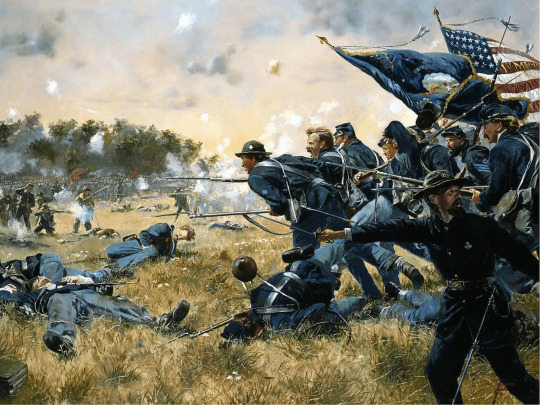
🎵"oh we'll rally round the flag, boys, rally once again, shouting the battle cry of freedom! The Union forever, hurrah, boys, hurrah, down with the traitors and up with the star!"
4 notes
·
View notes
Text
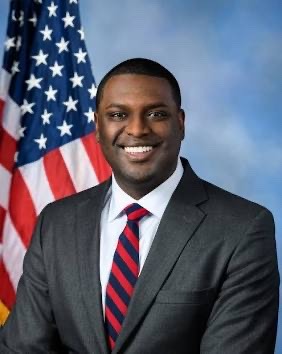
Congressman Mondaire L. Jones (May 18, 1987) is a lawyer and politician. A member of the Democratic Party, he was the Representative for New York’s 17th congressional district (2021-23). The district includes most of central and northwestern Westchester County and all of Rockland County. A member of the Democratic Party, he is one of the first openly gay African American members of Congress.
He was born in Nyack, New York, and grew up in Spring Valley, New York. He earned his BA from Stanford University and his JD from Harvard Law School.
Before attending law school, he interned in the Department of Justice during the presidency of Barack Obama. He worked 5 years for Davis Polk & Wardwell, as a law clerk for Andrew L. Carter Jr. of the District Court for the Southern District of New York and the Westchester County Law Department. He provided pro bono legal aid through The Legal Aid Society.
He voted to certify the 2020 presidential election and voted to impeach during Trump’s second impeachment. He and Ted Lieu co-wrote a letter to the Attorney Grievance Committee of the New York State Supreme Court-Appellate Division asking for Rudy Giuliani to be disbarred due to his role in the 2021 US Capitol attack.
He successfully lobbied US Immigration and Customs Enforcement to halt the deportation of Paul Pierrilus, who was scheduled to be the last person to be deported during the Trump administration. Pierrilus, was to be deported to Haiti, a country he had never been to, before Jones intervened.
He voted for the American Rescue Plan, the PRO Act, the Equality Act, the For the People Act, the George Floyd Justice in Policing Act, and the Bipartisan Background Checks Act.
He, Senator Edward Markey, Representative Hank Johnson, and House Judiciary Chair Jerry Nadler pushed for an expansion of the Supreme Court from 9 seats to 13. He called for a third reconstruction in a Washington Post opinion piece. #africanhistory365 #africanexcellence
2 notes
·
View notes
Text
The ‘Will of the People’ Post-Election Horror Show
by Jim Bovard | Nov 4, 2024
On the morning after elections, many voters wake up and instinctively quote Dorothy Parker: “What fresh hell is this?”
“Will of the people!” is the correct answer—at least if a Democrat won the election. Actually, the notion that election results represent the “will of the people” is one of the most audacious triumphs of democratic propaganda.
Ever since the Civil War era, presidents have periodically invoked “will of the people” to sanctify their own power. President Andrew Johnson declared in 1867 that “the appointing power”—i.e., himself—“represents the collective majesty and speaks the will of the people.” Johnson’s “majesty” took a wallop two months later when he was impeached by the U.S. House of Representatives. Johnson, a notorious drunkard, barely survived a Senate vote that would have ended his reign.
Almost a century ago, President Calvin Coolidge rolled out religious buncombe to consecrate the worship of vote counts. In a 1926 speech on the 150th anniversary of the signing of the Declaration of Independence, President Calvin Coolidge added God’s ballot to the election returns, declaring, “We hold that the duly authorized expression of the will of the people has a divine sanction.” Unfortunately, God forgot to tell Coolidge to run for re-election.
Franklin Delano Roosevelt was perhaps the first president to invoke “the will of the people” to sanctify every power grab. In a 1937 fireside chat, he denounced the Supreme Court for thwarting “the will of the people”—which FDR supposedly incarnated because he had been re-elected the previous year. The Court had struck down several New Deal laws as unconstitutional in part because they vested vast arbitrary power in federal bureaucrats. FDR sought to pack the Supreme Court with appointees who would rubberstamp his policies, sparking a backlash that hobbled him until he pulled the nation into World War II.
FDR also bastardized “will of the people” to sanctify tyranny by American allies. At the 1945 Yalta Conference, FDR co-signed a communique with Josef Stalin and British Prime Minister Winston Churchill that “pledged to the earliest possible establishment through free elections of governments responsive to the will of the people” in the former Axis nations and liberated countries of Europe. The secret deals cut at Yalta guaranteed that a hundred million lives in eastern and central Europe would be blighted by the Soviet boot.
Invoking the “will of the people” is the Washington version of elevator music. In 2015, a Barack Obama White House webpage declared, “Our government provides online resources to help you learn more about how it works to enact the will of the people of the United States.” The page listed links to a dozen other federal sites, including one not slavishly devoted to popular approval—the Central Intelligence Agency.
4 notes
·
View notes
Text
ABRAHAM LINCOLN •Team of Rivals: The Political Genius of Abraham Lincoln by Doris Kearns Goodwin (BOOK | KINDLE | AUDIO) •Lincoln by David Herbert Donald (BOOK | KINDLE | AUDIO) •And There Was Light: Abraham Lincoln and the American Struggle by Jon Meacham (BOOK | KINDLE | AUDIO) •The Political Life of Abraham Lincoln Trilogy by Sidney Blumenthal: -A Self-Made Man: The Political Life of Abraham Lincoln, Vol. I, 1809-1849 (BOOK | KINDLE | AUDIO) -Wrestling With His Angel: The Political Life of Abraham Lincoln, Vol. II, 1849-1856 (BOOK | KINDLE) -All the Powers of the Earth: The Political Life of Abraham Lincoln, Vol. III, 1856-1860 (BOOK | KINDLE | AUDIO)
ANDREW JOHNSON •Andrew Johnson: A Biography by Hans L. Trefousse (BOOK) •Impeached: The Trial of President Andrew Johnson and the Fight for Lincoln's Legacy by David O. Stewart (BOOK | KINDLE | AUDIO) •The Impeachers: The Trial of Andrew Johnson and the Dream of a Just Nation by Brenda Wineapple (BOOK | KINDLE | AUDIO) •High Crimes & Misdemeanors: The Impeachment and Trial of Andrew Johnson by Gene Smith (BOOK)
ULYSSES S. GRANT •Grant by Ron Chernow (BOOK | KINDLE | AUDIO) •American Ulysses: A Life of Ulysses S. Grant by Ronald C. White (BOOK | KINDLE | AUDIO) •The Man Who Saved the Union: Ulysses Grant in War and Peace by H.W. Brands (BOOK | KINDLE | AUDIO) •Grant's Final Victory: Ulysses S. Grant's Heroic Last Year by Charles Bracelen Flood (BOOK | KINDLE | AUDIO) •The Personal Memoirs of Ulysses S. Grant: The Complete Annotated Edition by Ulysses S. Grant, Edited by John F. Marszalek (BOOK | KINDLE)
RUTHERFORD B. HAYES •Rutherford B. Hayes: Warrior and President by Ari Hoogenboom (BOOK) •Fraud of the Century: Rutherford B. Hayes, Samuel Tilden, and the Stolen Election of 1876 by Roy Morris, Jr. (BOOK | KINDLE)
JAMES GARFIELD •President Garfield: From Radical to Unifier by C.W. Goodyear (BOOK | KINDLE | AUDIO) •Destiny of the Republic: A Tale of Madness, Medicine and the Murder of a President by Candice Millard (BOOK | KINDLE | AUDIO) •The Dark Horse: The Surprise Election and Political Murder of President James A. Garfield by Kenneth D. Ackerman (BOOK | KINDLE) •Garfield by Allan Peskin (BOOK | KINDLE)
CHESTER A. ARTHUR •The Unexpected President: The Life and Times of Chester A. Arthur by Scott S. Greenberger (BOOK | KINDLE | AUDIO) •Gentleman Boss: The Life of Chester Alan Arthur by Thomas C. Reeves (BOOK | KINDLE) •Chester A. Arthur: The Accidental President by John M. Pafford (BOOK | KINDLE | AUDIO)
#Books#Book Recommendations#Book Suggestions#Presidents#Presidency#Books About Presidents#Presidential Books#Books About Presidency#Abraham Lincoln#President Lincoln#Lincoln Administration#Andrew Johnson#President Johnson#Johnson Administration#Ulysses S. Grant#President Grant#General Grant#Grant Administration#Rutherford B. Hayes#President Hayes#Hayes Administration#James A. Garfield#James Garfield#President Garfield#Garfield Administration#Chester A. Arthur#President Arthur#Arthur Administration#Assassination of James Garfield#Garfield Assassination
22 notes
·
View notes
Text
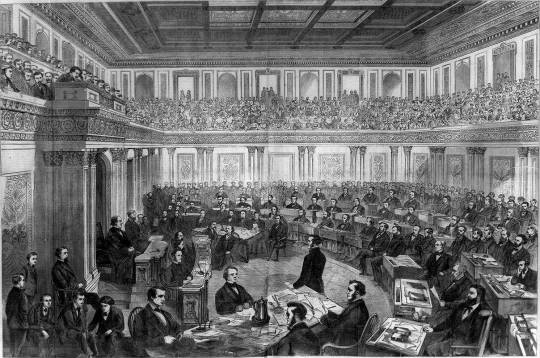
This Day in History: Andrew Johnson Impeachment
On this day in 1868, votes are taken in President Andrew Johnson’s impeachment trial. Thirty-five Senators voted to convict, one vote shy of the 36 votes then needed to remove him from office.
That trial has since been labeled a “political circus” and “a contest for power.” Regardless, Johnson would survive the attempt against him.
Americans were then recovering from a brutal Civil War that had left hundreds of thousands dead or wounded. Johnson wasn’t supposed to be the President that got them through this trying period. He was President only because Abraham Lincoln had been killed just one month into his second term.
Needless to say, Johnson struggled.
The story continues here: https://www.taraross.com/post/tdih-johnson-impeached
5 notes
·
View notes
Text














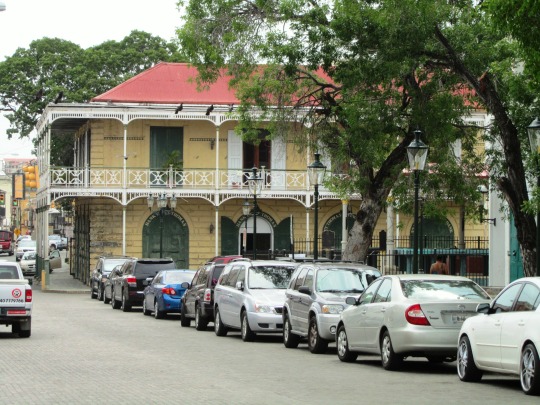









Transfer Day
A century ago, the United States made its final territorial acquisition with the purchase of the U.S. Virgin Islands. Located at the southernmost stretch of the Caribbean, the Virgin Islands are a group of three main islands — Saint Croix, Saint John, and Saint Thomas, and a cluster of 50 minor cays and islands. The day is celebrated throughout the Virgin Islands with great vigor. Parades are held at the state halls, and the American Flag is hoisted during the evening ceremony.
History of Transfer Day
The American military leadership began eyeing the Virgin Islands in the mid-1860s. The idea of the acquisition was put forward by the Secretary of State William H. Seward in 1867. For a negotiated price of $7.5 million, the Danish government ratified the sale. But the islands bore witness to intense catastrophe in the following year. Back home, the impending impeachment of President Andrew Johnson upset the proceedings even further, and the plan was finally dropped. Decades passed but the notion of a Caribbean naval base persisted with the top diplomats of the United States.
In 1900, the Secretary of State John Hay initiated the second round of negotiations, and a sale was agreed upon for $5 million. However, this time, the Danish waged their revenge and blew the deal out of the Panama Canals.
The relations between the two holdings remained sour for the majority of the early 20th century. However, the fear of European expansion in the Caribbean pushed the American diplomats to enter into a fresh round of negotiations. In March 1916, the United States offered $25 million in gold coins in exchange for the immediate cessation of the Virgin Islands. The deal was finalized in the same year, and the treaty was approved by the U.S. Senate on September 7, 1916.
Although the sale was ratified to establish a U.S. military stronghold in the Caribbean, the island proved to be a lucrative investment because of the booming tourism industry. Today, Virgin Islanders are American citizens with a seat in Congress and many constitutional protections. March 31 is celebrated to honor the peaceful cessation of the islands and the strategic expansion of the American empire.
Transfer Day timeline
1666
The Danish Occupation
Denmark occupies St. Thomas and begins consolidating the adjacent islands of St. John and St. Croix through siege and/or purchase.
1807
The European Tussle
The British acquire the islands after the fall of the Danes and hold on to them until the Danish win them back in 1815.
1917
The American Purchase
The United States of America purchases the three islands for $25 million.
1927
The Constitutional Grant
The American constitution grants citizenship to the inhabitants of the Virgin Islands.
Transfer Day FAQs
Is Transfer Day a federal holiday?
Transfer Day is a public holiday and the majority of businesses and schools stay closed.
Which nationality do the Virgin Islanders have?
The Virgin Islanders are U.S. citizens. Because they derive their citizenship from a constitutional statute, the Islanders can not participate in federal elections but since 1970, they have been able to elect a delegate to represent them in the United States Congress.
Do U.S citizens need a passport to visit the Virgin Islands?
U.S. citizens arriving from the mainland and Puerto Rico do not need to present a passport or visa to enter the Virgin Islands.
How To Observe Transfer Day
Reenact the ceremony: It is fair to say that the Transfer Day ceremony had a bit of a dramatic flair. From the lowering of the Dannebrog (the Danish flag) to the swelling number of generals as the Star-Spangled Banner filled the air. On March 31, stage a skit of your own.
Read about the history: The U.S. Virgin Islands have been home to humans since 1000 B.C. From the native inhabitants to the Danish occupation, the islands have a rich and diverse history. The islands have also borne witness to mass ethnic cleansing, displacement, slavery, and other atrocities. On Transfer Day, take a quick crash course on America’s Caribbean territory.
Eat Red Grout: Red Grout is a traditional Danish pudding, made from guavas and tapioca. It’s a delicacy on the U.S. Virgin Islands and is served to locals every year on Transfer Day. The dish is easy to make and is enjoyed best with a scoop of vanilla cream.
5 Lesser Known Facts About The U.S Virgin Islands
A fight for freedom: A century before the United States outlawed slavery, the islanders led an unsuccessful slave rebellion in 1733.
The bioluminescent nightlife: Pockets of the Virgin Islands light up at night due to the clusters of tiny plankton, called dinoflagellates, spread all across the space.
The party of the pirates: The Virgin Islands remain a safe haven for the pirates, a practice that started in the 17th century when Governor Adolph Esmit allowed them to enter the area for lucrative trade opportunities.
Christopher Columbus coined the name: Columbus stopped by the islands in 1493 and named the cluster of lands ‘The Virgins’ in honor of Saint Ursula and her 10,000 virgins.
Home to Alexander Hamilton: One of the Founding Fathers of the U.S., Hamilton spent a sizable chunk of his youth on the streets of St. Croix, working as a clerk and experimenting with his writing.
Why Transfer Day is Important
It celebrates diversity: The islands stretch across the Caribbean and are home to a diverse community of Native, Black, and Latino Americans. Transfer Day illuminates the rich contribution of these societies to the fabric of America.
It uplifts the tourism industry: Tourism is the backbone of the Virgin Islands’ economy. Over 50% of the Virgin Islanders are employed in the hospitality and travel-related industries. Transfer Day educates us about the hidden beauty of the islands.
It honors the strategic triumph: The bloodless, strifeless transfer was made possible after years of strategic negotiations and good-faith politics. At the dawn of World War I, the acquisition prevented the establishment of a German stronghold across the Caribbean coast as well.
Source
#Transfer Day#U.S. Virgin Islands#31 March 1917#US history#travel#Magen's Bay#St. Thomas#Caribbean Sea#Fort Christian#landscape#seascape#cityscape#USA#Emancipation Garden#Charlotte Amalie#Blackbeard's Castle#Paradise Point#Dronningens Gade#iguana#animal#Veterans Drive#summer 2013#original photography#vacation#tourist attraction#landmark#architecture#USVI#anniversary
2 notes
·
View notes
Text

Khrushchev repeatedly boasted that he could place a nuclear bomb in orbit ("We placed Gagarin and Titov in space, and we can replace them with other loads that can be directed to any place on Earth"), and the Kennedy administration worried that he would score a peacetime propaganda victory ("If the Soviets place a bomb in orbit and threaten us and if this adminstration has refused to develop a capability to destroy it in orbit, you will see the first impeachment proceeding of an American President since Andrew Johnson").
The worries of a Soviet bomb in orbit led to the first nuclear-armed anti-satellite systems, Project 505 (based on the Nike Zeus anti-ballistic missile) and Program 437 (based on the Thor intermediate-range ballistic missile). Based at Johnston Island in the Pacific Ocean, the Thor missiles stood ready to shoot down a single Soviet satellite within 24 hours until they were retired in 1974.
2 notes
·
View notes